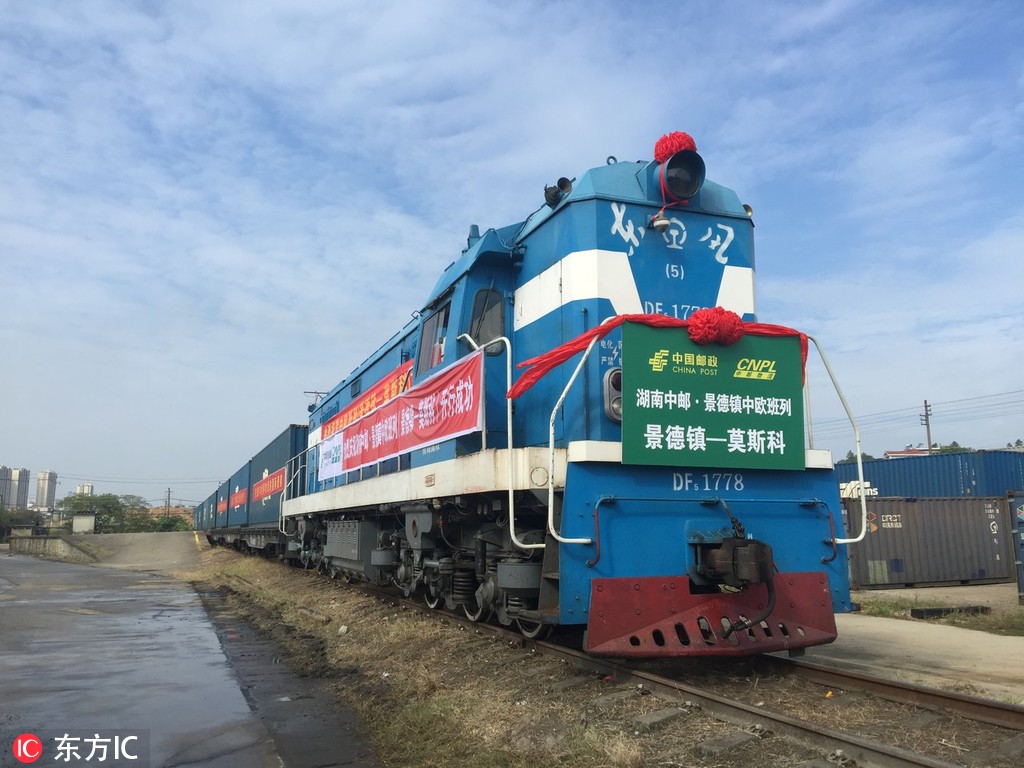Logistics improvements boost transportation and profits
2019-01-30 09:20:02
In September, a train carrying porcelain and tea pulled out of the railway station in Jingdezhen, Jiangxi province, headed for Moscow in Russia. It marked the first time Chinese porcelain had been sent overseas on a China-Europe freight train. The train, which carried 43 containers packed with $3 million worth of products, arrived in Moscow 14 days later, having covered 10,257 kilometers.
The rail line greatly shortens the journey time, is much safer than road transportation and reduces costs for logistics companies, Chen Weihong, master of Jingdezhen Railway Station, told China National Radio.
In December 2017, Mei Yi, mayor of Jingdezhen, stated in the local government's Work Report that the city would apply an Internet Plus strategy for the development of its porcelain industry.
The move aimed to promote brand marketing, premiumization-moves toward making more expensive, premium products-and globalization, while devising a model that would integrate production, trade, technology and the porcelain culture.
Since 2012, e-commerce enterprises have entered the porcelain business, which resulted in 24.8 million pieces being transported in 2017, accounting for more than 80 percent of all shipments that originated in the city, the report said.
However, Jingdezhen's porcelain industry has been severely hit by its location and local geography because the city is surrounded by mountains.
The only exit, in the northwest, crosses the Poyang Lake wetland, so the city has to be approached via tunnels or bridges from every direction.
While the scenery attracts tourists, it also imposes heavy costs on logistics, a key factor in the porcelain trade because rising transportation costs weaken the competitiveness of related businesses.
Meanwhile, due to the fragility of the porcelain, transportation is always expensive and time-consuming.
Porcelain made in Jingdezhen has a global reputation, but solving the distribution problem is crucial in the internet era.
Last year, JD Logistics, part of the e-commerce giant JD.com, provided customized solutions for the porcelain products supply chain that allowed goods to be distributed nationwide without having to pass through Nanchang, the provincial capital, as was required before.
The move has improved efficiency and reduced the number of breakages in transit.
In addition to JD, many express delivery companies are contributing fresh ideas to porcelain industry logistics.
In 2017, ZTO Express opened a special channel for the transportation of large porcelain products, resulting in the volume of traffic hitting 2,600 metric tons for the year.
Meanwhile, Best Inc, YTO Express and SF Express have introduced preferential policies for porcelain companies to reduce logistics costs and promote e-commerce in the sector.
According to an announcement by the Jiangxi government in September, the combined revenue of Jingdezhen's two logistics clusters reached 6.6 billion yuan ($986 million) in the first half year of last year.
The clusters ranked 11th in the province, and 5.19 billion yuan of their revenue came from the porcelain industry.
